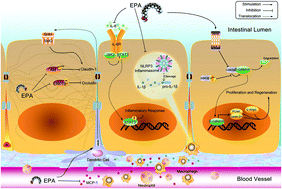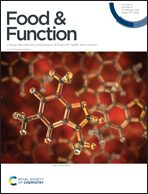Differential effects of EPA and DHA on DSS-induced colitis in mice and possible mechanisms involved
Abstract
Background: The anti-inflammatory effect of n-3 PUFAs has been widely documented. Emerging evidence suggests that the main component of n-3 PUFAs, eicosapentaenoic acid (EPA) and docosahexaenoic acid (DHA), may have differential effects in ulcerative colitis (UC). It was aimed to clarify their differential effects in UC. Methods: Eight-week-old male C57BL/6J mice were randomly divided into 7 groups, namely control, UC model, salicylazosulfapyridine (SASP), low-dose DHA, high-dose DHA, low-dose EPA, and high-dose EPA. DHA, EPA and SASP treatment groups were orally treated accordingly for 9 weeks. During the 5th to 9th week the control group was given distilled water, while other groups were given distilled water with 2% dextran sodium sulfate (DSS) to induce UC. Body weight loss, diarrhea, and stool bleeding were recorded to calculate the disease activity index (DAI). The level of tight junction proteins Claudin-1 and Occludin, and cytokines including TNF-α, IL-6, and IL-1β as well as inflammatory cell markers such as MPO, F4/80, and MCP-1 in the intestinal epithelium were measured using western blotting. Activation of IL-6/STAT3 and NLRP3/IL-1β inflammatory pathways was also assessed. Levels of proliferation-related proteins of the Wnt/β-catenin pathway with c-myc, Cyclin-D1, and PCNA were detected. Results: EPA, superior to DHA, significantly attenuated DSS-induced colitis evidenced by reduced DAI scores, cytokine production and inflammatory cell infiltration. Mechanically, EPA triggered a marked up-regulation of Claudin-1 and Occludin with down-regulation of their up-stream Akt and ERK. EPA also inhibited NLRP3/IL-1β and IL-6/STAT3 inflammatory pathways and up-regulated the Wnt/β-catenin pathway. Conclusions: EPA is more suitable to be used for the treatment of UC than DHA.



 Please wait while we load your content...
Please wait while we load your content...